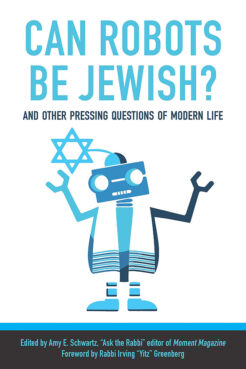Geoffrey Levin
Sun, January 28, 2024

On a cold and rainy November day, a 65-year-old American rabbi trudged down the muddy roads of a Palestinian refugee camp. When the rabbi and his colleagues stopped, refugees gathered around them in a scene of “disappointment, frustration, [and] despair.” Gaunt men and “children, big-eyed and thin,” walked up and clutched the rabbi’s raincoat. Several began chanting, in Arabic, “We want to go home!” Weary, broken women watched silently from their tents as rain and wind chilled their bare feet. Guilt overcame the rabbi. “In my deepest heart, I said the prayer of confession,” the rabbi wrote, referring to a prayer recited on Yom Kippur, the fast of atonement. “Anachnu Chatanu.” We have sinned.
One could imagine this scene taking place recently. Yet it was 1953 when Rabbi Morris Lazaron walked through the refugee camp—Shatila, located in Lebanon—where he witnessed firsthand the suffering of Palestinian families who had lost their homes during the war that accompanied Israel’s creation in 1948. The “illimitable misery” of the refugees, to use Lazaron’s words, had a decisive impact on the former head rabbi of the prestigious Baltimore Hebrew Congregation. After his trip, Rabbi Lazaron began calling on the Israeli government to recognize the right of Palestine’s Arab refugees to return to their prewar homes and urged the Jewish state to admit 100,000 of them into the country immediately.
Lazaron felt that the Jewish historical experience should compel all Jews to support the Palestinian refugees. As members of what he called “the tribe of the wandering feet,” Lazaron pressed fellow American Jews to remember that they, too, were once “strangers in the land of Egypt.” Jewish identity weighed heavily on the rabbi’s mind as he considered how to respond to Palestinian suffering. Yet the hidden context of the rabbi’s trip reveals that the stakes of his response extended far beyond the realm of Jewish ethics. Lazaron’s visit to Lebanon had been organized and financed by a secretly CIA-funded advocacy organization called American Friends of the Middle East, a group created to give Americans a more sympathetic picture of the Arab side of the Israeli-Arab conflict. AFME published Lazaron’s book about the trip in 1955, apparently as part of a broader public relations effort that aimed to make it easier for United States officials to pressure Israel to accept the return of 75,000 Palestinian refugees.
The CIA was far from the only government body interested in American Jewish responses to the Palestinian refugee crisis. Lazaron articulated his lament on a playing field where various governmental actors—Israeli, American, and Arab—all jockeyed to shape U.S. public opinion surrounding the Palestinian refugee question. Just as AFME was organizing Lazaron’s trip, Israeli diplomats were quietly working to undermine both the Jewish newspaper that Lazaron wrote for and the anti-Zionist Jewish group he represented, the American Council for Judaism, which in turn had begun fostering warm ties with Arab officials. The American Jewish debate over Palestinian rights involved a struggle over Jewish identity, as Lazaron’s words reflect. But as his broader story shows, the debate also is, and always has been, part of a high-stakes political struggle between government officials and others over the future of Israel, the fate of the Palestinians, and the orientation of American foreign policy toward the Middle East.
There is a narrative about the trajectory of the American Jewish relationship with Israel that pervades all corners of the organized Jewish community today. “For millions of secular-minded American Jews, Israel was the glue. Israel was the cause,” declared conservative commentator Bret Stephens at the American Jewish Committee’s 2022 Global Forum. “Zionism was an effective and powerful and emotionally satisfying substitute for religious observance,” he continued, bemoaning that in contrast, “at the height of last year’s war [the 2021 Gaza crisis], so many young American Jews were eagerly signing letters denouncing Israeli behavior.”
While young American Jewish letter-signers may not appreciate Stephens’ tone, they probably would not dispute the gist of his historical observation, which is considered common knowledge both in Jewish political commentary and in scholarly works. For decades, American Jews had rallied around the Jewish state, with Israel uniting American Jewry in a way that nothing else could, including religion. But then at some point, according to this telling, young left-wing Jews began criticizing Israel over its policies toward the Palestinians, breaking with past generations to shatter this once-sacred consensus and imperil any semblance of Jewish unity.
Despite its ubiquity, this narrative is flawed in its basic assumptions. Ever since an estimated 750,000 Palestinians lost their homes amidst Israel’s birth in 1948, there have been American Jews deeply unsettled by Israeli policies toward both the Palestinian refugees and Arabs living under Israeli rule. These critics of old consisted not only of a few stray rabbis like Morris Lazaron, but in fact extended well into the American Jewish establishment—including leaders and staff members of the AJC. The collective amnesia with regard to this history has been complete: None of the over 1,000 AJC members in Stephens’ audience likely had any idea that in 1957 their organization’s president confronted Prime Minister David Ben-Gurion, urging him to liberalize Israel’s policies toward its Arab citizens. The audience would not have known that at an AJC gala 66 years before their own, the Jewish advocacy organization announced a plan to aid Palestinian refugees that it ultimately shelved in response to Israeli pressure. And unless they had sifted through faded yellow papers in their archives, they could not have known that the first Middle East expert on the AJC’s staff, Don Peretz, lost his job because Israeli diplomats did not like his research on the Palestinian refugee issue.
Stephens and his audience cannot be faulted for being unaware of these past events because they are, more or less, unknown. Histories of American Jewish life make almost no mention of any communal concern for the Palestinians in the years after Israel’s creation, implying that it emerged, at the earliest, in the 1970s. Even studies of Jewish anti-Zionism and non-Zionism during Israel’s early years have tended to neglect the Palestinian question, focusing instead on debates over the role of nationalism in Jewish identity.
The fact that this historical undercurrent is so unknown is, to some extent, the result of concerted campaigns. From the beginning, Israeli diplomats watched American Jewish interest in Palestinian rights issues with deep suspicion. Declassified Israeli foreign ministry files reveal that some of Israel’s most celebrated diplomats secretly plotted to undermine American Jews who wrote about the sensitive question of Palestinian refugees, often succeeding in getting them removed from positions of influence. These diplomats persuaded reluctant employers to drop “troublesome” employees whom they had once trusted, quietly sidelining various American Jewish efforts to highlight or resolve Palestinian rights issues in the 1950s, 1960s, and 1970s.
These findings call for a rethinking of the very nature of the early Israel-American Jewish relationship. So much written about this era focuses on the emotional affinities that American Jews held for Israel, but far less has been written on Israel’s views of American Jewry. Rather than acting from a place of emotional connection and intracommunal kinship, Israeli officials acted in pragmatic ways toward the American Jewish community in the context of a wider public relations battle that raged between them and pro-Arab voices, which included Arab diplomats and some in the U.S. government. Israel during its early years was in a precarious place as it faced an economic crisis, high security costs, and the expense of resettling hundreds of thousands of Jewish immigrants. To meet these budgetary needs, the Israeli government turned to American Jews, who between 1948 and 1956 sent Israel more than $700 million in charitable donations and over $270 million in cash from bond sales, a combined sum that would total over $10 billion in 2022 dollars. American supporters of Israel, including Jews, also lobbied elected officials on diplomatic issues and successfully urged the government to send economic aid to Israel, which totaled $450 million (around $5 billion today) in combined loans and grants during that same eight-year stretch. Since the young country was reliant on American Jewish support in so many ways, perhaps it should be expected that its officials acted to ensure that the question of Palestinian rights did not weaken American Jewry’s commitment to Israel, harm Israel’s public image, and damage the U.S.–Israel relationship more broadly. Israel was, in short, acting as any state might, given the circumstances.
To a certain extent, my new book shows that Israeli leaders instrumentalized American Jewish organizations, which highlights the power of the young state and the political savvy of its diplomats. But to focus only on that would be an oversimplification. American Jewish organizations first had to yield some of their autonomy to the Jewish state. Doing so involved American Jews beginning to conceptualize their interests and ideals not as distinct from those of Israel but as identical to them—a process that blurred crucial differences between the community and the state. This required that these organizations turn away from a distinctive American Jewish identity as a historically dispossessed minority that has thrived in a liberal secular state and instead adopt the values of Israel, a country premised on meeting the needs of an ethno-national majority. To frame the question underlying this shift in biblical terms, as Lazaron might have: Is the core of Jewish identity remembering that “we were once strangers in the land of Egypt”? Or is it all about maintaining a restored Kingdom of David?
American Jews of the 1940s, 1950s, and beyond often had remarkably deep conversations about the meaning of Israel’s power over Palestinians. In recovering this history, Our Palestine Question serves not so much as a starting point for discussion as a medium that will inform conversations that are already taking place today and engage them with lost voices from the past. From there, one can see how the path to the present involved not fate but crucial decisions made over the course of decades that have shaped the politics of today surrounding Israel, the Palestinians, and the nature of transnational Jewish politics.
This history sheds light on political dynamics that at times feel very distant from those of the present. The American Jewish establishment did not always view anti-Zionism as inherently antisemitic. Some Jewish community leaders considered themselves “non-Zionist” until years after Israel’s founding. American Jewish institutions that had been established long before 1948 took time to accommodate themselves to the reality of Jewish statehood, a process that involved countless discussions about what Jewish sovereignty overseas meant for Jewish citizens of the United States. Jews had been a perpetual minority, so many American Jewish institutions had mobilized around liberal and left-leaning ideologies designed to protect minority groups and those seeking refuge. Suddenly, after 1948, there was a Jewish state that not only ruled over a non-Jewish minority group but also denied the right of refugees to return to their homes on the basis of their ethnicity and religion. Israel’s birth created a sense of cognitive dissonance for these American Jewish organizations as they attempted to come to terms with Israel’s power over the Palestinians without abandoning the ideologies that they regularly used to protect the rights of Jews outside the Jewish state.
More than 75 years later, American Jews are grappling with new aspects of these same crises, an internal struggle that the bloody Israel-Hamas war in Gaza has made all that more urgent. These dilemmas will not be resolved easily, but perhaps the only way to start working through them is by reflecting on their long, forgotten history.
Excerpt adapted from the introduction of Our Palestine Question: Israel and American Jewish Dissent, 1948–1978, by Geoffrey Levin, published by Yale University Press, ©2023 by Geoffrey Levin. Refer to book for footnotes. All Rights Reserved.









